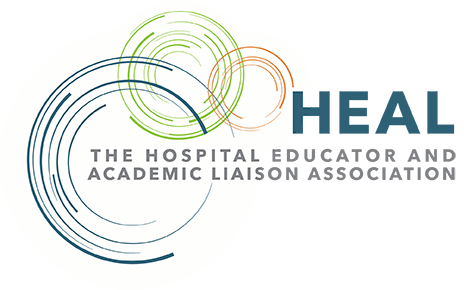Conference Schedule – at a glance
Information included below:
- Contact hours
- Schedule
- Keynote speaker
- Session descriptions
- Speaker biographies
Contact Hours
Certificates of Contact Hours (up to 16 hours) will be awarded to attendees who complete post-session surveys. All content (pre-recorded and recorded) will be available for viewing and professional development credit for 30 days following the live conference day.
***(Schedule subject to change)
| Virtual HEAL Association Conference | ||||
|
10:30-10:45 am est
|
Welcome and Kickoff Presented by: Kelly Ihejiawu, HEAL President |
|||
|
10:45am-12:05 pm est
|
Live General Session/Keynote A Journey of Smiles, Love, and Support Presented by: Brady Lucas, MEd, Survivor, Smiler, and Storyteller |
|||
|
12:05-12:10 pm est
|
Break | |||
|
12:10-1:10 pm est
|
Breakout (Live Lecture) Overview of Psychiatric Medications and Their Potential Impact in the Classroom Presented by: Kaylee Davis-Bordovsky, MD, University of Texas Southwestern Medical Center |
|||
|
Breakout (Live Lecture) Development and Implementation of an Interdisciplinary Special Education Eligibility Tool for Students with Chronic Health Conditions Presented by: Lisa Carey, EdD, Alicia Cannon, PhD, ABPP, and Mallory Legg, JD, Kennedy Krieger Institute
|
||||
|
Breakout (Live Lecture) Early Learning for our Youngest Patients: Supporting Family Access to Early Intervention Services Presented by: Roberta Rossman, MEd, MSW, LSW, Children’s Hospital of Philadelphia
|
||||
|
Breakout (Live Lecture) TBD
|
||||
|
1:10-2:00 pm est
|
Lunch/Awards and Poster Session – bring your lunch, celebrate our annual recipients, and visit our poster presentations! Poster Presentations
|
|||
| 2:00-2:05 pm est | Break | |||
|
2:05-3:05 pm est
|
Breakout (Live Lecture) Pediatric Long COVID: Investigation into Schooling Needs and Barriers Presented by: Laura Malone, MD, PhD and Calliope Holingue, MPH, PhD, Kennedy Krieger Institute/Johns Hopkins University School of Medicine |
|||
|
Breakout (Live Lecture) Science Journeys: Using Patient’s Health Journey to Drive a Holistic Health and STEM Curriculum Presented by: Lisa Bochey, MA and Rachel Smilow, MA, Children’s National Hospital
|
||||
|
Breakout (Live Lecture) Inclusive Education, Pedagogies and Emotionally-Based School Avoidance (EBSA) Presented by: Rebecca Fielden, BA, MA, PGCE, Bishop Grosseteste University
|
||||
|
Breakout (Live Lecture) TBD
|
||||
|
3:05-3:15 pm est
|
Break | |||
|
3:15-4:15 pm est
|
Breakout (Live Lecture) A Framework for Trauma Informed Practices Within Hospital-Based Schools Presented by: Lauren Delgaty, MA, Marisa Marraccini, PhD, NCSP and Telieha Middleton, BA, University of North Carolina at Chapel Hill
|
|||
|
Breakout (Live Lecture) Creating a Traveling Library Program in a Pediatric Hospital: Bringing Books and Literacy to Hospitalized Children Presented by: Rebeca Grysko, PhD, CBIS, and Sara Crowe, MEd, Nemours Children’s Hospital
|
||||
|
Breakout (Live Lecture) The Journey to Establishing a Brighter Future: Preschool Service Delivery Presented by: Sarah Donaire, BSED, Anne Quinn, MSEd, and Kaci Richardson, BSED, St. Jude Children’s Research Hospital |
||||
|
Breakout (Live Lecture) The Importance of School Re-entry for Pediatric Chronic Pain Populations: Holistic Benefits, Challenges, and Collaborative Approaches Presented by: Bethany Battershell, MEd, CTRS, Cleveland Clinic Children’s Rehabilitation Hospital
|
||||
|
4:15-4:20 pm est
|
Break | |||
|
4:20-5:20 pm est
|
Live Closing Session A Full Circle Experience: From Student to Advocate Presented by: Brady Lucas, MEd, Survivor, Smiler, and Storyteller and Kimberly Matthews, EdD, HEAL Vice President, Penn State Health Children’s Hospital
|
|||
| 5:20-5:30 pm est | Closing Remarks Presented by: Kelly Ihejiawu, HEAL President | |||
| PRE-RECORDED SESSIONS: | ||||
|
||||
|
|
||||
Brady Lucas
Survivor, Smiler, and Storyteller
Brady Lucas is a Survivor, Smiler, and Storyteller. Brady’s inspiration to become an author and write his first book Smiley’s Smile came from his experience undergoing treatment for 2 childhood cancer diagnoses and finding power within education.
Brady believes all children should have access to information that can empower them to understand and be involved regardless of their age within their healthcare journey. Brady also believes support, courage, and friendship are needed elements to create a sense of belonging.
Brady has a Bachelor of Biobehavioral Health and Master of Education in Curriculum and Instruction with an emphasis in Children’s Literature from Penn State University. Brady currently resides in the Greater Seattle Area with the love of his life, Julia. Brady lives a life for Jesus and by the motto Smiles Make The World Go Round.
A Framework for Trauma Informed Practices Within Hospital-Based Schools
Presented by: Lauren Delgaty, MA, Marisa Marraccini, PhD, and Telieha Middleton, BA, University of North Carolina at Chapel Hill
A Global Perspective: Chronic Pain in the School Setting
Presented by: Leesa Ashton, BEd, CF, Perth Children’s Hospital and Debbie South, MEd, CBIS, Cincinnati Children’s
Pain rehabilitation liaison teachers from Perth and Cincinnati Children’s Hospitals will introduce chronic pain and its impact on function including school, discuss the role of pain liaison teachers and look at the global need for chronic pain education and support strategies in schools to enhance educational outcomes. They will also introduce the recently created International Pain in Schools Alliance (IPSA), comprised of pain clinicians and teachers from around the globe and how participants can become involved.
Breaking Barriers: How Community and Education Partnerships Helped a Student Overcome OCD to Earn His GED
Presented by: Dean Heus, MS, and Michael Parulski, MS, Wauwatosa School District
This presentation highlights the collaborative efforts between the Wauwatosa School District, healthcare providers, and community organizations to support a student in completing his GED despite severe treatment-resistant OCD. By adapting education to his therapy schedule, providing secure learning spaces, and utilizing remote technology, student successfully overcame barriers to education. This approach demonstrates the importance of flexible, coordinated support for students with mental health challenges to achieve academic success.
Creating a Traveling Library Program in a Pediatric Hospital: Bringing Books and Literacy to Hospitalized Children
Presented by: Rebeca Grysko, PhD, CBIS, and Sara Crowe, MEd, Nemours Children’s Hospital
For pediatric patients, especially those undergoing long-term treatments, the absence of familiar routines, activities, and school can have a detrimental impact on their cognitive and emotional development. One effective solution to mitigate these challenges is through the creation of a traveling library program and an initiative that brings books and shared reading experiences directly to the bedsides of hospitalized children. This session will focus on how to design, implement, and sustain a traveling library program within a pediatric hospital. Attendees will leave with a toolkit for creating their own traveling library programs, including ideas for book selection, partnership building, and overcoming challenges.
Development and Implementation of an Interdisciplinary Special Education Eligibility Tool for Students with Chronic Health Conditions
Presented by: Lisa Carey, EdD, Alicia Cannon, PhD, ABPP, and Mallory Legg, JD, Kennedy Krieger Institute
Early Learning for our Youngest Patients: Supporting Family Access to Early Intervention Services
Presented by: Roberta Rossman, MEd, MSW, LSW, Children’s Hospital of Philadelphia
Early intervention provides services at a crucial time of development, providing therapies in the child’s environment and supporting caregivers to embed supportive learning strategies throughout the day. Accessing these services is not always seamless for our patients with complex medical conditions. Barriers to accessing early intervention, strategies to support access to appropriate educational services, and ways for medical teams and educational providers to work cooperatively will be discussed.
Inclusive Education, Pedagogies and Emotionally-Based School Avoidance (EBSA)
Presented by: Rebecca Fielden, BA, MA, PGCE, Bishop Grosseteste University
Overview of Psychiatric Medications and Their Potential Impact in the Classroom
Presented by: Kaylee Davis-Bordovsky, MD, University of Texas Southwestern Medical Center
Students with mental health needs, whether returning to school after a psychiatric hospitalization or those who are being managed on an outpatient basis, are often prescribed psychiatric medications. This presentation aims to outline the different classes of psychiatric medications that students may take while discussing how they improve classroom behavior and academic function as well as potential side effects that may require further accommodations.
Pediatric Long COVID: Investigation into Schooling Needs and Barriers
Presented by: Laura Malone, MD, PhD and Calliope Holingue, MPH, PhD, Kennedy Krieger Institute.
Promoting Literacy and STEAM in the Hospital; Book and STEAM Cart
Presented by: Melanie Bales, BS, and Amy Wilson, MEd, Children’s of Alabama
Science Journeys: Using Patient’s Health Journey to Drive a Holistic Health and STEM Curriculum
Presented by: Lisa Bochey, MA and Rachel Smilow, MA, Children’s National Hospital
New Member Orientation
Facilitated by: Kelly Ihejiawu, MA and Mindy Elliott, MS
New to HEAL? Join this informative session to learn about our mission, vision, and what membership has to offer you.
The Importance of School Re-entry for Pediatric Chronic Pain Populations: Holistic Benefits, Challenges, and Collaborative Approaches
Presented by: Bethany Battershell, MEd, CTRS, Cleveland Clinic Children’s Rehabilitation Hospital
The Journey to Establishing a Brighter Future: Preschool Service Delivery
Presented by: Sarah Donaire, BSED, Anne Quinn, MSEd, and Kaci Richardson, BSED, St. Jude Children’s Research Hospital
The Power of Moment Making in the Hospital
Presented by: Rachel Meyen, MEd, Hannah Bohlen, Brianne Starin, Durham Public Schools Hospital School at Duke
Translating Not Transplanting: Methods for Situating Hospital Liaison Services Across Diverse Contexts
Presented by: Lisa Carey, EdD, Lisa Jacobson, PhD, NCSP, ABPP, Kennedy Krieger Institute, and Margaret Flood, EdD, Maynooth University, Ireland
Understanding the KID in Kidney Disease: Lessons Learned from an Interdisciplinary Care Model
Presented by: Kellee Clevenger, BEd, Alix McLaughlin, PhD, HSPP, and Emily Kalscheur, PhD, HSPP, Riley Hospital for Children
The pediatric dialysis unit not only delivers imperative medical treatment for kidney health but serves as the exemplar of interdisciplinary care through embedded academic, cognitive, and mental health supports. This model shifts the narrative of the pediatric hospital setting from being centered around physical health but instead to whole-child care. Understanding the patterns of needs through the perspectives of an educational liaison, pediatric psychologists, and neuropsychologist, attendees will garner strategies for identifying and addressing concerns.

